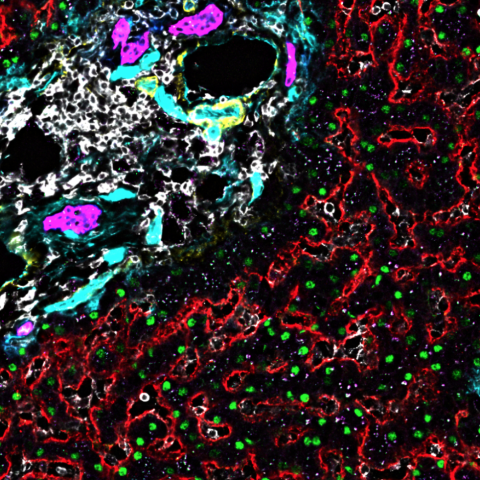
A CODEX (co-detection by indexing) image of a periportal field in the liver from a patient with hepatocellular carcinoma. Image credit: Benjamin Ruf et al.
New research sheds light on a seldom-studied type of immune cell in the liver and suggests that these cells could potentially be targeted to infiltrate and attack liver tumors more effectively. The results were published August 17, 2023, in Cell.
A form of liver cancer called hepatocellular carcinoma (HCC) remains difficult to treat with conventional therapies. For example, only some people with HCC respond to treatment with immune checkpoint inhibitors, a class of drug that helps boost the immune system’s ability to attack cancer. In recent years, evidence has begun to emerge suggesting that a type of immune cell, called mucosal-associated invariant T (MAIT) cells, may have some influence over a patient’s response to these inhibitor drugs.
MAIT cells are typically only found in the liver, gut or lungs. They are a type of T cell, which is responsible for attacking harmful pathogens in the body like cancer cells. MAIT cells, however, are not well understood compared to other immune cells.
To gain more insights, Tim F. Greten, M.D., Senior Investigator, and Firouzeh Korangy, Ph.D., Staff Scientist in the Thoracic and GI Malignancies Branch, with their colleagues sought to study MAIT cells in unprecedented detail. They analyzed liver tissue samples — which included both tumors and the surrounding tissue — from 37 HCC patients using a combination of imaging, flow cytometry and single-cell RNA sequencing. Then they applied an artificial intelligence algorithm to help map out the function, location and neighboring cells of MAIT cells.
The results show that MAIT cells are abundant in the tissue surrounding tumors, but not in the tumors themselves. This was a surprising result, since, in theory, MAIT cells should be infiltrating the tumors and attacking them.
“The MAIT cells — especially the few that do infiltrate the tumor — are really dysfunctional,” says Greten. “They aren’t very effective at launching an attack once they are in the tumor.”
The analysis also revealed that cells neighboring the MAIT cells were emitting PD-1 signals, which are known to suppress immune cell activity. In experiments with human cells in petri dishes and in HCC tumors in mice, Greten’s team confirmed that blocking these signals from neighboring cells could boost the MAIT cells’ ability to attack cancer. Together, these results may explain why immune checkpoint inhibitors, which help suppress the same PD-1 signal emitted from neighboring cells, can help revive MAIT’s ability to infiltrate and attack tumors.
“So far, we thought that immune checkpoint inhibitors only work to activate other types of T cells. But in this case, we have a lot of data suggesting that these drugs also affect MAIT cells in the liver. That could be clinically relevant,” says Greten. His team will continue to study these cells in detail and explore additional ways of potentially activating them to launch attacks against tumors.